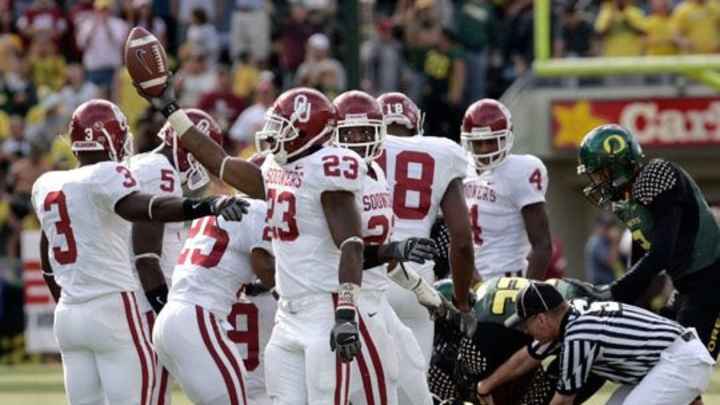Oklahoma vs. Oregon, 2006: Allen Patrick Recovered the Football

Part 3 of 3
SAN ANTONIO — This year’s Alamo Bowl matchup between Oklahoma and Oregon — set for Wednesday night in the Alamodome — immediately rekindled memories of the OU-UO series in the mid-2000s.
Everyone’s first thought, of course, went to the most recent meeting, the controversial 2006 showdown in Eugene decided by inept Pac-10 officiating and incomprehensibly botched replay reviews of an onside kick.
But that was merely the third game between the Ducks and Sooners in a three-year span.
OU and UO actually met a handful of times in the past: In 1958, Bud Wilkinson’s squad took a 6-0 victory over Oregon; in 1966, Jim Mackenzie’s only OU team beat the Ducks 17-0; in 1972, Chuck Fairbanks’ final Sooner squad crushed Oregon 68-3; and in 1975, Barry Switzer’s national champions demolished the Ducks 62-7.
They didn’t play again for almost 30 years before Bob Stoops faced Oregon three straight times in 2004, 2005 and 2006.
Before covering Stoops’ fourth and presumably final matchup against the Ducks — this time in San Antonio — SI Sooners recounts Stoops’ first three meetings against Oregon:
- - - -
Sept. 16, 2006
No. 18 Oregon 34, No. 15 Oklahoma 33
Eugene
For most of the sunny Saturday postgame in Eugene, the biggest controversy was whether Oregon’s Brian Paysinger touched his team’s onside kick before it traveled 10 yards.
For the record, he did. And for the record, it wasn’t called. And even though it was reviewed, it wasn't overturned.
But what awaited the No. 15-ranked Oklahoma Sooners was a fate far more ruthless, an officiating mistake far more egregious.
As Oregon rallied from 13 points down behind quarterback Dennis Dixon, the Sooners couldn’t withstand both the 18th-ranked Ducks and a Pac-10 officiating crew that was later suspended for their late-game errors, casting doubt on the entire function of replay review in college football.
It was the second year of replay review in the Pac-10, and it was also the infant stages of YouTube. Both played a huge role in determining what actually happened amid a chaotic scene at Autzen Stadium.
The bottom line: Oregon was given possession of the football even though Oklahoma’s Allen Patrick clearly recovered the football — all by himself, yards away from the pileup of players that had tried to fall on it — and even held the ball up in the air and gave it back to the officials.
It was an inexplicable sight — one that no one had ever really seen before, and most of those involved in the game weren’t even sure what really happened.
"We did a lot of good things, but, obviously, not enough," Oklahoma coach Bob Stoops said that day. "We came up one point short."
It was 15 years ago now, so Stoops has a slightly different perspective as the teams prepare to meet for the first time since in Wednesday night’s Alamo Bowl.
“I was given way too much credit for the poise, (that) I didn't blow up in the press conference after,” Stoops said last week, “because I did not see him showing the world the ball. I see it the next day, I busted about everything in my office you could bust when I realized what had happened.”
Stoops gave his usual postgame press conference — “we should have handled our business, we shouldn’t have put it in the officials’ hands; we shouldn’t have had to settle for two fourth-quarter field goals” — and then got on the team bus, drove to the airport and flew back to Norman without knowing that Patrick had actually picked up the ball.
“I didn't see Allen with the ball,” Stoops said last week. “Everyone else had. And had I seen that, I might have been suspended a few games myself.”
There was also the little fact that video showed Paysinger touching the ball before it traveled the necessary 10 yards. Replay official Gordon Riese and referee David Cutaia disagreed on that one, too.
Regardless, Dixon completed the comeback with a 23-yard touchdown pass — ironically, to Paysinger — that put the Ducks ahead with 46 seconds to play.
Reggie Smith returned the ensuing kickoff 55 yards, and Adrian Peterson carried once before Garrett Hartley’s 44-yard field goal was blocked as time expired.
Dixon finished 26-of-41 for 341 yards with two touchdowns and two interceptions. His counterpart, Paul Thompson was 13-of-23 for 174 yards.
But the day belonged to Peterson, who had arguably his greatest game as an Oklahoma running back with 211 yards on 34 carries. In the face of a lathered up, record Oregon crowd of 59,269, Peterson took over with 145 yards in the fourth quarter alone.
“Words can’t express how I feel right now,” Peterson said afterward. “Fought hard for four quarters and came up short.”
Oregon led 13-6 at halftime, but the Sooners took a 20-13 lead in the third quarter on Thompson’s 31-yard touchdown pass to Malcolm Kelly.
Dixon hit Jaison Williams with a 30-yard touchdown pass to tie it at 20, but then Peterson finished off a long drive with a 17-yard touchdown run, and Hartley drilled two field goals to put the Sooners up 33-20 with 3:11 to play.
Dixon capped off Oregon’s ensuing possession with a 16-yard TD run with just 69 seconds left, and then after the onside kick, he connected with Paysinger for the tying TD. Paul Martinez’ extra point was good, and the Ducks went on to claim the victory.
The following Monday, Stoops spoke at length about the controversy, and then-OU president David Boren showed up to a Stoops press conference for the first time to formally launch a protest about the outcome of the game.
Boren wrote a letter to then-Big 12 commissioner Kevin Weiberg, asking that the game be stricken from OU’s season record — a request that was not granted.
One policy change came directly from the game, however: the Big 12 has contracted the use of its own conference officiating crews for non-conference road games ever since (Stoops had said he might consider canceling the Sooners’ scheduled trip to Washington in 2008 if that change wasn’t made.)
The game itself had championship implications, too. OU finished the regular-season with two losses and ranked No. 7. One of the Sooners' losses was to defending national champion Texas. A one-loss Oklahoma team, which went on to recapture the Big 12 Championship, might have been in the conversation for a spot in the BCS National Championship Game with four other one-loss teams (Florida, Michigan, Louisville, Wisconsin) at the end of the season. Instead, the Sooners were banished to the Fiesta Bowl, where they sleepwalked through a stunning loss to Boise State.
The officiating crew was suspended by the Pac-10 office for one game, and Riese requested a leave of absence, which lasted the entire season. He soon retired and later owned his mistake — and his frustration with it.
“I feel so bad for missing that call,” Riese told the Associated Press, “it’s driving me crazy.”
Fifteen years later, it’s still driving Oklahoma fans crazy.
